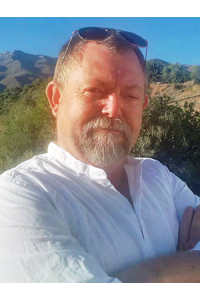The overhead sign was broken. It was dark green and the right corner was missing. I leaned forward over the steering wheel to look up at it. The drizzle had washed most of the dust off, but what was left had painted muddy streaks across the words. I made out Suzano, Poa and F Vansconcelos, with an arrow pointing left. My windshield wipers squeaked to a slow rhythm, washing water across the words and making them warp.
It was Sunday in the Itaquaquetuba district of Sao Paulo and everyone was hiding from the rain. The road was empty, so I spun the wheel and turned into the Rua Primero de Maio. I could hear the tires on the wet blacktop and it sent damp shivers up my back. Primero de Maio ran along the east bank of the Tieté River where it opened out into a broad, slow flowing expanse of water that was more like a lake than a river. Along the right there was a long row of slums, not quite favelas, but close. Most of them were cheap, two-story construction of brick in pale blue, white and dirty orange. They had big steel gates on the ground floor and covered terraces above with satellite dishes, bikes and strings of washing elbowing each other for space.
Along the left on the river bank were the real favelas—lean-tos made out of wooden pallets, boxes and torn tarpaulins. Hungry, half-naked families huddled inside and stared with frightened, incurious eyes at a world whose best offer for them was indifference. There had always been extreme poverty in Brazil—in much of the world—but this had the look of an ugly, infected sore, one that was going to spread.
I drove past houses that doubled as shops, selling sweets, cigarettes and beer. I was looking for number three hundred twenty, but the numbers seemed to jump around a lot. I finally found it three or four hundred yards down the road, headed west. I drove past it then pulled into a patch of wasteland on the banks of the river, climbed out and walked the short distance to the house. I hunched into my shoulders with my collar turned up. There was a crude, dirty-gray plastic intercom outside the gate. I pressed the call button, and after a couple of seconds, a voice that could have been male or female said, “Alô…?”
I said, “Igor sent me.” That was Russell’s idea.
The gate buzzed and clanked and I pushed through into the shelter of what I could now see was a carport. The patter of the water outside echoed in the enclosed, tiled area and a damp breeze snuck in around my ankles. I crossed the floor where small puddles had accumulated from the windblown drizzle. There was an imitation-wood door that looked as though it were made of aluminum. I was about to hammer on it when it opened.
I had been told I was meeting a man, but there was a woman standing there looking at me. She had no expression, the way no expression can be a hostile expression. She had straight black hair, black eyes and the kind of checked, button-down overall that women wear when they want to look really unattractive while they clean houses. I said, “Who are you?”
She turned and disappeared up an invisible staircase. She left the door open, so I figured I was supposed to follow. I stepped in. It was a steep, narrow stairwell. When I got to the top, I was in a large, shabby room with broad windows and glass doors looking out onto a large terrace and the river-lake beyond. Ugly clouds bellied low over the trees and the water.
The guy was sitting on an old sofa that had collapsed back when the world was young. He had something on his face that might have been a beard. He was wearing baggy pants with stripes of many colors, and he had one of those bags that men who wear sandals like to sling across their shoulders to make themselves look like Christian carpenters. It was open by his side, and he was rolling a cigarette and watching me while he did it. There was an empty glass on the table and a half-empty bottle of rum.
I said, “Are you—?”
Before I could finish, he said, “Agostinho, I am Agostinho Pereira.”
I paused, then said, “You are Perkins. I don’t want to know your real name.”
He rolled his eyes, crossed his legs and licked the paper. “Estúpido! Like an es-spy es-story!”
He wasn’t Brazilian. He was Portuguese. I could tell because he sounded Russian when he spoke. I said, “You have something for me.”
He glanced at me over his rollup. “I haff time to roll a cigarette?” He showed it to me, as though I might not know what a cigarette was. I decided I didn’t like him. It was an easy decision to make. I said, “Who’s the woman? Does she speak English?”
He froze, gaped slightly and raised his eyebrows in an ‘excuse me?’ kind of gesture, like my stupidity had momentarily paralyzed him. “Joelma? English?” He gave a small laugh that was as mirthless as it was ugly. He got to his feet with an effort and walked quickly to a peeling blue door at the back of the room. He pushed through it and I saw a darkened, filthy bedroom. I heard the sound of a wardrobe door opening and he came out again, carrying a black attaché case. It was covered in leather, but I knew it was steel. He stopped in front of me and cocked his hip as he handed it over. I took it, but he didn’t let go. He narrowed his eyes and gave me something that looked like the inbred cousin of a smile.
“Try not to be conspicuous. Don’ handcuff it to your wrist or always be lookin’ over your shoulder.” He did an exaggerated demonstration of a person looking over their shoulder.
I said, “Let go of the case.”
He screamed like a parakeet, and after a second, I realized he was laughing.
Again, I said, “Let go.”
He stopped laughing and eyed me then let go of the case. “Have a drink before you go.”
I shook my head. I had a bad feeling and suddenly I wanted to be out of there. I was about to say so when there was a buzz from the kitchen where Joelma was knocking pans around. I said, “Who is that?”
He shrugged, dropped onto the sofa and reached for the bottle. “People visit me. I have friends.”
I was getting mad. I said, “Now? Today?”
Joelma came out of the kitchen and went down the stairs, muttering. I reached for my piece. Agostinho sighed and rolled his eyes. He said, “Relax, chill. Is probably my friend, Paolo.” There were quiet voices downstairs, then two soft phut! sounds. Agostinho went pale and stared at me. I swore. There were feet tramping, running on the stairs. They erupted out of the stairwell. There were two of them, and they were not human.
They moved fast and without fluidity. They both wore black suits and Wayfarer sunglasses and had no expression at all on their faces. Their skin was pale, almost like china—and they were identical. I raised my Smith & Wesson and shot the nearest one point blank in the chest. He staggered back two steps then strode forward and punched from the hip. I acted without thinking and raised the attaché case. The punch connected with the steel, lifted me off my feet and threw me across the room. I landed in a heap, badly winded, and all I could think was that I mustn’t let go of the case or my revolver.
The freak was staring at me. I cocked the Smith & Wesson. He turned his head to Agostinho, who was on the sofa looking real sad and shaking his head. They both advanced on him. The one who’d hit me grabbed him and dragged him to his feet. He was moaning and saying, “Nooo, ay nooo…!” like a kid who doesn’t want to go to bed. The other freak took hold of his head, twisted and ripped it off. There was a geyser of blood that hit the ceiling as his hands and legs thrashed and jerked.
I may have shouted incoherently. I know I scrambled to my feet. I fired, but not at them. I knew that was pointless. I fired at the plate glass, and as it shattered and crashed to the floor, I ran through the shower, covering my head with the case then vaulting over the terrace. I landed on the roof of a parked car. Sprawling, I slid off and landed in a heap in the mud. I staggered to my feet and ran across the wet blacktop. Frightened eyes watched me from the favelas. I could hear my breathing rasping in my throat. My heart was wild. My mind raced.
I was fumbling in my pocket for the key. I had a spasm of pain in my chest from the blow. My legs were bruised and shaking from the fall. I had the key out and was sliding across the mud to my car when I heard the dull thump behind me. One of them had followed my example and jumped onto the car roof. Then I heard another. I glanced over my shoulder as my car flashed and beeped. They were running, closing on me fast.
I clambered in, hit central locking, slotted in the key and pressed the ignition. The engine roared then the window shattered and a large, hard hand was trying to grip my collar. I slammed into reverse and hit the gas. The tires spun in the mud. The car didn’t move. I could feel myself being dragged toward the shattered window. A second hand was reaching in. I bellowed something incoherent. I knew I needed less gas. With my left hand, I pushed against the door, resisting their pull. They were immensely strong. I could feel myself slipping. I eased off the gas. The car jolted and began to move, pulling them with me. I felt the rear end bump onto blacktop. I floored the pedal and spun the wheel. I saw one of them thrown clear and sprawled across the road. He still had no expression on his damned face. The other was dragging and scrabbling, still gripping my collar.
I slammed on the brakes and felt him hit the rear wing. As he scrambled to his feet, I pulled the Smith & Wesson from my pocket and blew two rounds into his elbow. He didn’t loosen his grip but he ripped half my collar off. I slammed into first and hit the gas again as the other guy was getting to his feet. I rammed him hard and sent him bouncing over the roof. I took the corner in third. In the rearview mirror, I could see them on their feet, climbing into the car with the dented roof.
I found a pack of Camels in my pocket, shook one halfway out and poked it into my mouth. I lit up and inhaled deep. My hands were shaking. I kept seeing Agostinho’s head ripping off and his blood hitting the ceiling like a crimson fire hydrant. I took random turns left and right, not heading anywhere in particular except vaguely south and west, forcing myself to cool down. Here and there were stretches of wasteland or parks—Juiz de Fora, Villa Monte Belo and either side of the Mal, Tito Avenue where vast shanty towns of makeshift dwellings had sprung up. The misery and hunger had reached such vast proportions that they’d become invisible.
Eventually I found a car park near the Jardim Cotching area. I dumped the car and took three taxis to three different locations scattered around the city. I was pretty sure I’d lost anyone who was trying to tail me, so I caught a fourth cab to the Tivoli Hotel in the heart of town.
I had a long, hot shower followed by a longer cold one then toweled myself dry, dressed and called Russell. Even on the secure line, he insisted on talking code. I think he enjoyed it.
“Did you meet Perkins?”
“Yeah. He wasn’t in good health.”
“I’m sorry to hear that. What was it?”
“He had diarrhea. Verbal.”
“I see. How bad was it?”
“Pretty bad. It seemed to annoy his neighbors.”
“Did you—?”
“I got what I went for, but you know what he’s like. He’s an excitable guy. He lost his head.”
“What?”
“Literally.”
“That’s unfortunate.”
I couldn’t agree. “Yeah, well, you know, that’s a subjective judgment, Russell.”
“I trust you weren’t infected.”
“No. I quarantined myself. But at the risk of taxing the metaphor, Russell, I don’t know how far the bug may have spread. Let’s talk when I get back. Is there anything I need to know?”
“Agreed. Like what?”
“Like what’s in the case?”
“Shut up, Liam. No, you don’t need to know that. I’ll see you tomorrow.”
“Day after. I land at seven-twenty a.m.”
“Good. Have a good flight.”
* * * *
I found the cocktail bar and ordered a large Black Bush. I was halfway through it and about to order another when she sat next to me. I felt her climb on the stool and I felt her watching me. I ignored her. I was missing Maria and was feeling in need of her special brand of loving right then. The last thing I needed was a pick-up. I heard her order a Bradford Martini and the exquisite, cut glass voice was strangely familiar. Then she said, “Hello, Liam. It’s been a long time.”
I still didn’t look. I didn’t need to. I said to my glass, “Catherine. Catherine Howard.” Now I turned to her. “Or is it Mary Jane Carter? Or was that fake, too? What’s your name now? Anne Boleyn? Scarlet O’Hara?”
The barman poured her drink and moved away. She bobbed the olive a few times and glanced at me. She had her hair cut short. It was very black. Her eyes were still green. She was stunning. She said, “I don’t blame you for being angry.”
“That’s big of you. What the hell are you doing here?”
She picked up her drink and sipped it, watching me. She set it down, centering it carefully on the mat. “Looking for you, Liam.”
I shook my head. “No.”
“You need to hear me.”
“Uh-uh. No, I don’t.”
I signaled the barman for the bill.
She said, “I know you are working with Professor Whittering—with Russell. I know why you’re here.”
The barman put the bill in front of me. I glanced at it, unseeing. I said, “I don’t know what the hell you’re talking about.” I signed the bill and stood.
She said, “Please, sit down. We need to talk.”
“You need to talk. I don’t.”
“You need to listen.”
“Forget it!”
“I know what’s in the case.”
I stared at her a while. I said, “Okay, talk.”
She made a small gesture with her head and her eyebrows at the stool I’d just vacated. I suddenly felt unreasonably mad—madder than the situation called for. I leaned on the bar and told the waiter to give me another Bushmills. We were quiet while he poured it. Then she said, “I’ve missed you.”
“Cut it out.”
“Why? It happens to be true.”
I turned to face her. “Listen, Catherine. Every word you ever said to me was a lie. Everything you ever did was to try and manipulate me, just like you manipulated Rupert and then killed him. So, cut out the bullshit. It’s not going to work.”
She spent a moment tracing shapes on the bar with her finger. “That’s what you remember, Liam. But there was a time when you felt something for me. That was also real.”
“For me or for you? Maybe I felt something once—briefly. But the woman I cared about didn’t exist. She was a lie, one of your many. So, no, you’re wrong. It wasn’t real.”
“Are you so sure you know me, Liam?”
“What do you want, Catherine? Does Sinead know you’re here?”
She didn’t answer straight away. Then she said, “She sent me. She asked me to come. I didn’t want to. I didn’t want to see you again.”
“Why? Why are you here? Why did she send you?”
She took a long time to answer—like the words were going to make a big difference and she didn’t like the difference they were going to make. Finally, she said, “Sinead is working with Russell. We are working with Russell.”
“What the hell do you mean? Why hasn’t he told me this? Is this more of your bullshit, Catherine?”
“He can’t tell you about it. It’s classified and highly sensitive. It’s not just me and Sinead. There is a group of us now. After we broke away, more followed. We are working—cooperating—with Russell and his…” She left the word unsaid.
I studied her face, thinking hard about what she was telling me. Joanna had said the same thing, that more and more were defecting. I said, “So, if Russell isn’t telling me because its sensitive and classified, why are you telling me? And what did Sinead send you for?”
She glanced at me then down at the bar again. She was having real difficulty saying it—or she was giving an Oscar-winning performance. Both were possible. She said, “Because this concerns you. It concerns you directly. It’s something you need to know.”
“If that’s true, Russell would have told me.”
“I told you. He can’t!”
“Why?”
“Maria is pregnant!”
My skin went cold and I felt the hair on my neck stand up. I said, “What?”
“She is pregnant.”
“Bullshit!”
“Liam, please—”
“How the hell would you know?”
“Please, listen to me!”
I could feel the rage building inside me. I was fighting to keep my voice under control. “You are lying! If she were pregnant, she would have—”
“She doesn’t know herself yet.”
“What? Why am I even talking to you? God dammit! You’re lying! We’ve been using—”
“It’s not yours.”
The room moved. My head throbbed. My heart pounded once against my ribs. I felt sick. I said, “I am not going to listen to you. You are a lying, manipulative monster. Get away from me and never talk to me again. Stay away from me!”
The barman had stopped what he was doing and was watching. A couple of the patrons had paused in their conversation to look. I threw some money on the bar and left.



















